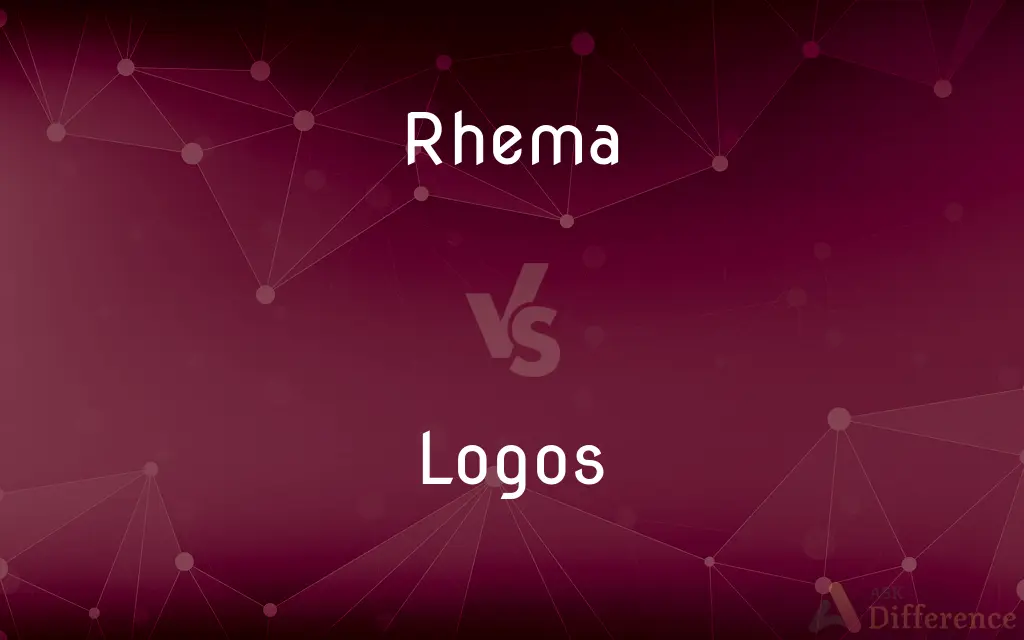Rhema vs. Logos — What's the Difference?
Edited by Tayyaba Rehman — By Fiza Rafique — Updated on September 30, 2023
Rhema refers to an individual, personal word or utterance, often from God, while Logos denotes a universal, eternal reason or principle, and in Christian theology, the Word of God or Christ.

Difference Between Rhema and Logos
Table of Contents
ADVERTISEMENT
Key Differences
Rhema and Logos are both Greek words that have profound significance in religious and philosophical contexts. Rhema typically refers to an individual word, utterance, or a particular message. In Christian contexts, it often points to a personalized message or revelation from God, a specific word for a specific situation. Logos, in contrast, carries a broader connotation. It signifies an overarching principle, reason, or word that is universal and eternal.
In the New Testament, Rhema is often used to describe spoken words, highlighting the significance and power of individual utterances. When believers mention a 'Rhema word' from God, they're referencing a fresh, personal revelation or guidance they believe God has imparted to them. Logos, on the other hand, is used to denote the message in its entirety. In Christian theology, it is epitomized in John 1:1, "In the beginning was the Word (Logos), and the Word (Logos) was with God, and the Word (Logos) was God."
Outside of religious contexts, Logos has been of immense philosophical importance, especially in ancient Greek thought. To philosophers like Heraclitus, Logos embodied the rational principle that governed and organized the cosmos. It was the eternal truth or knowledge. Rhema, being more specific and situational, doesn't hold such a broad philosophical stance but remains integral in understanding communication, especially in its fleeting, momentary essence.
Comparison Chart
Meaning
Specific word or utterance
Universal principle or reason
Context
Often personal and timely
Universal and eternal
ADVERTISEMENT
In Christian Theology
Personal revelation or message from God
The Word of God or Christ
Usage in Scripture
Used to describe individual spoken words
Denotes the overarching message or principle
Philosophical Relevance
More about momentary communication
Pertains to eternal truth governing the cosmos
Compare with Definitions
Rhema
Rhema is a particular message or revelation, often divine in origin.
Through prayer, he received a Rhema for his situation.
Logos
Logos embodies the universal truth or eternal knowledge.
Ancient thinkers revered the concept of the Logos.
Rhema
Rhema emphasizes the individuality and uniqueness of a word.
The preacher's Rhema touched the hearts of many.
Logos
Logos, in Christian belief, refers to the Word of God or Christ.
John described Jesus as the Logos incarnate.
Rhema
Rhema signifies a specific word or utterance, often of importance.
She felt the Rhema spoken to her was a guiding light.
Logos
Logos is a rational principle believed to govern the cosmos.
The universe operates under the guidance of the Logos.
Rhema
Rhema in theology indicates a personalized word from God.
Believers often seek a Rhema to navigate challenges.
Logos
Logos represents an overarching and foundational message.
The sermon focused on the importance of understanding the Logos.
Rhema
Rhema is a timely and situation-specific word.
The community needed a Rhema of hope during the crisis.
Logos
Logos (UK: , US: ; Ancient Greek: λόγος, romanized: lógos; from λέγω, légō, lit. ''I say'') is a term in Western philosophy, psychology, rhetoric, and religion derived from a Greek word variously meaning "ground", "plea", "opinion", "expectation", "word", "speech", "account", "reason", "proportion", and "discourse". It became a technical term in Western philosophy beginning with Heraclitus (c. 535 – c. 475 BC), who used the term for a principle of order and knowledge.Ancient Greek philosophers used the term in different ways.
Rhema
Rhema (ῥῆμα in Greek) literally means an "utterance" or "thing said" in Greek. It is a word that signifies the action of utterance.In philosophy, it was used by both Plato and Aristotle to refer to propositions or sentences.In Christianity, it is used in reference to the concept of Rhematos Christou, Jesus Christ's sayings.
Logos
The Word of God, or principle of divine reason and creative order, identified in the Gospel of John with the second person of the Trinity incarnate in Jesus Christ.
Rhema
(Christianity) A spiritual communication or inspiration from God to an individual, as opposed to the universal Logos.
Logos
(in Jungian psychology) the principle of reason and judgement, associated with the animus.
Logos
In pre-Socratic philosophy, the principle governing the cosmos, the source of this principle, or human reasoning about the cosmos.
Logos
Among the Sophists, the topics of rational argument or the arguments themselves.
Logos
In Stoicism, the active, material, rational principle of the cosmos; nous. Identified with God, it is the source of all activity and generation and is the power of reason residing in the human soul.
Logos
In biblical Judaism, the word of God, which itself has creative power and is God's medium of communication with the human race.
Logos
In Hellenistic Judaism, a hypostasis associated with divine wisdom.
Logos
(Christianity) In Saint John's Gospel, especially in the prologue (1:1-14), the creative word of God, which is itself God and incarnate in Jesus. Also called Word.
Logos
(rhetoric) A form of rhetoric in which the writer or speaker uses logic as the main argument.
Logos
Alternative case form of Logos
Logos
A word; reason; speech.
Logos
The divine Word; Christ.
Logos
The divine word of God; the second person in the Trinity (incarnate in Jesus)
Logos
Logos is the principle of divine reason and order.
Philosophers often ponder the nature of the Logos.
Common Curiosities
Can Rhema be seen as guidance?
Yes, believers often view a Rhema word as specific guidance or direction for their situation.
Are Rhema and Logos exclusive to religious contexts?
No, while they have religious significance, Logos also holds philosophical importance, especially in Greek thought.
What's the essence of Logos in philosophy?
Logos is seen as the rational principle governing and organizing the universe.
Is Rhema always divine in nature?
While often used in divine contexts, Rhema essentially denotes a specific word or message, not necessarily divine.
How is Logos introduced in the New Testament?
Logos is introduced as "In the beginning was the Word (Logos)," denoting its eternal nature.
What do Rhema and Logos represent?
Rhema represents a specific utterance or word, often from God, while Logos signifies a universal principle or reason.
How are Rhema and Logos used in Christian theology?
Rhema often denotes a personal revelation from God, whereas Logos refers to the Word of God or Christ.
Can Rhema change from situation to situation?
Yes, Rhema is often situational, providing specific insight or guidance.
Share Your Discovery

Previous Comparison
Recurrence vs. Occurrence
Next Comparison
Division vs. RegionAuthor Spotlight
Written by
Fiza RafiqueFiza Rafique is a skilled content writer at AskDifference.com, where she meticulously refines and enhances written pieces. Drawing from her vast editorial expertise, Fiza ensures clarity, accuracy, and precision in every article. Passionate about language, she continually seeks to elevate the quality of content for readers worldwide.
Edited by
Tayyaba RehmanTayyaba Rehman is a distinguished writer, currently serving as a primary contributor to askdifference.com. As a researcher in semantics and etymology, Tayyaba's passion for the complexity of languages and their distinctions has found a perfect home on the platform. Tayyaba delves into the intricacies of language, distinguishing between commonly confused words and phrases, thereby providing clarity for readers worldwide.
















































